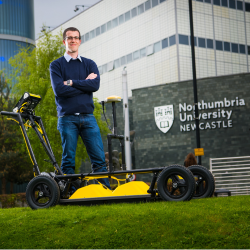-
Study
-
UCAS Clearing 2024
- Clearing Courses
- The Clearing Process
- UCAS Tariff Points
- Clearing 2024 FAQs
- Confirmation
- Clearing Virtual Event
-
Undergraduate
- Search for a Course
- Undergraduate Open Day & Events
- Application Guides
- Northumbria University UCAS Exhibitions
- Foundation Years
- Undergraduate Fees & Funding
- School & College Outreach
- Continuing Professional Development
-
Postgraduate
- Postgraduate Study Degree
- Postgraduate Research Degrees
- Postgraduate Open Days and Events
- Postgraduate Fees & Funding
- Flexible Learning
- Thinking about a Masters?
- Continuing Professional Development
- Change Direction
-
Student Life
- The Hub - Student Blog
- Accommodation
- Life in Newcastle
- Support for Students
- Careers
- Information for Parents
- Students' Union
- Northumbria Sport
-
-
International
International
Northumbria’s global footprint touches every continent across the world, through our global partnerships across 17 institutions in 10 countries, to our 277,000 strong alumni community and 150 recruitment partners – we prepare our students for the challenges of tomorrow. Discover more about how to join Northumbria’s global family or our partnerships.
View our Global Footprint-
Applying to Northumbria
- European Union
- Our London Campus
- Northumbria Pathway
- International Events
- Entry Requirements and Country Representatives
- Regional Offices
-
Northumbria Language Centre
- Faculty Requirements
- Acceptable English Requirements
- Pre-Sessional English and Study Skills
- Academic Language Skills Programmes (ALS)
-
International Fees, Funding & Scholarships
- International Undergraduate Fees
- International Undergraduate Funding
- International Masters Fees
- International Masters Funding
- International Postgraduate Research Fees
- International Postgraduate Research Funding
- International Money Matters
-
Life at Northumbria
- International student support
- Careers
-
International Mobility
- Current Northumbria Students
- Incoming Exchange Students
-
-
Business
Business
The world is changing faster than ever before. The future is there to be won by organisations who find ways to turn today's possibilities into tomorrows competitive edge. In a connected world, collaboration can be the key to success.
More on our Business Services -
Research
Research
Northumbria is a research-rich, business-focused, professional university with a global reputation for academic quality. We conduct ground-breaking research that is responsive to the science & technology, health & well being, economic and social and arts & cultural needs for the communities
Discover more about our Research -
About Us
-
About Northumbria
- Our Strategy
- Our Staff
- Place and Partnerships
- Student Profiles
- Alumni Profiles
- Leadership & Governance
- Academic Departments
- University Services
- History of Northumbria
- Contact us
- Online Shop
-
-
Alumni
Alumni
Northumbria University is renowned for the calibre of its business-ready graduates. Our alumni network has over 237,000 graduates based in 178 countries worldwide in a range of sectors, our alumni are making a real impact on the world.
Our Alumni - Work For Us
What will I learn on this module?
On this module you will learn that computing and information technology has changed both the world of business and the everyday lives of huge segments of the world's population. You will learn about the rapid evolution of computing technology and how this challenges many aspects of society and offers a potential to change the world. You will also learn how information is created, stored, manipulated, and processed. Using many hands-on practical sessions you will be exposed to some of the latest technologies underlying the Internet of things.The Internet of Things (IoT) is the network of physical objects—devices, vehicles, buildings and other items—embedded with electronics, software, sensors, and network connectivity that enables these objects to collect and exchange data. Using some of the latest educational tools you will begin to paddle in the edges of the ocean of computation.
The module is designed (as part of a programme of study) to prepare you to progress to an undergraduate degree. Topics include;
• Computing & Information
• Introduce the study of information, what is it?
• How Moore’s law has underpinned the development of computing technology.
• Give you a basic grasp of terminology, What is hypertext? What is hardware and software? What is a bit?
• What is inside an Operating System?
• You will See inside the machine and how it works.
• What are the current domains of knowledge of computer science
• You will learn about presenting data
• You will learn basic elements of program construction.
• Problem solving
• You will learn about techniques for problem-solving including decomposition, and brain storming.
• You will learn about top down vs. bottom up thinking and how this impacts on a project's business and technical needs.
How will I learn on this module?
You will be introduced to concepts, principles and techniques in lectures. These will include small exercises to complete within the lecture to aid your understanding. Seminar and lab practical sessions will be provided for you to practise and discuss the concepts, principles and techniques developed in lectures. You will be taught through enquiry based learning; you will be armed with knowledge and tools, then given problems for you to solve. This enquiry based learning will be done either individually, in pairs or in groups. There will be a significant element of interactive learning and demonstrations as part of the teaching strategy with the tutors demonstrating key elements to enhance the learning and topic work. Group work will be incorporated into the teaching where students will work together on tasks such as research projects or debates. Through fun challenges, you will develop problem-solving skills. Working in teams you will develop your skills in collaboration, and team working, as well as get a chance to gain confidence in presenting your ideas to your peers and non-technical audiences
You will be challenged to find your own solutions to some of the classic problems of computing.
All module material will be available on the eLearning Portal (ELP) so that you can access information when you need to and we operate an open door policy to help support your learning. The university library offers support for all students through its catalogue and an Ask4Help Online service.
How will I be supported academically on this module?
You will be given advice and feedback on your work and progress on practical exercises during the timetabled classes.
The module team will guide and support you in the lecture and workshop practical sessions, including providing you with feedback on your work.
The module team will work closely with you in the practical sessions to conduct discussions and provide guidance on the subjects covered.
You will have continuous access to the eLearning Portal (ELP) to support you in your learning
We encourage peer supported learning by the use of group and team supported challenges.
What will I be expected to read on this module?
All modules at Northumbria include a range of reading materials that students are expected to engage with. The reading list for this module can be found at: http://readinglists.northumbria.ac.uk
(Reading List service online guide for academic staff this containing contact details for the Reading List team – http://library.northumbria.ac.uk/readinglists)
What will I be expected to achieve?
Knowledge & Understanding:
MLO1 You will be able to demonstrate a basic knowledge of the underpinning aspects of how a computer functions and how it manipulates information (basic programming)
MLO2 You will be able to confidently use the terminology (technical and business related) used in computing.
Intellectual / Professional skills & abilities:
MLO3 You will be able to decompose simple designs into a series of steps executable by a machine.
Personal Values Attributes (Global / Cultural awareness, Ethics, Curiosity) (PVA):
MLO4 To be able to look criticaly at technology and understand how it effects wider society.
How will I be assessed?
Summative assessment
A formal summative assessment will be through one portfolio assignment, worth 100% of the marks available. It will assess all of the MLOs.
You will produce items for the portfolio, including:
1. Solutions to set problems.(MLO1)
2. Presentations made (MLO4,MLO3)
3. Designs made(MLO3,MLO3)
You will be provided with written feedback on your portfolio.
Formative assessment
Formative assessment will take place through the practical exercises and work on your portfolio in the workshops. Your tutors will provide you with feedback on your work and progress.
Pre-requisite(s)
None
Co-requisite(s)
None
Module abstract
Without a knowledge of the past it is hard to understand the future. Over the last 60 years information technology has changed the everyday lives of huge segments of the world's population. But what is information? How is information created, stored, and processed? Using many hands-on practical sessions you will be exposed to some of the latest technologies underlying the Internet of things. You will be challenged to find your own solutions to some of the classic problems of computing and develop your key problem-solving skills.
Using some of the latest educational tools you wrangle your own code. While your future might not be the creation of code, seeing the basics of how it is done will equip you for a world where code creates your future.
This module will help to prepare you for entry onto a level 4 course of study within the department of Computer and Information Sciences.
Course info
UCAS Code I200
Credits 20
Level of Study Undergraduate
Mode of Study 1 year Full Time followed by a further 3 years Full Time or 4 years with a placement (sandwich)
Department Computer and Information Sciences
Location City Campus, Northumbria University
City Newcastle
Start September 2024 or September 2025
All information is accurate at the time of sharing.
Full time Courses are primarily delivered via on-campus face to face learning but could include elements of online learning. Most courses run as planned and as promoted on our website and via our marketing materials, but if there are any substantial changes (as determined by the Competition and Markets Authority) to a course or there is the potential that course may be withdrawn, we will notify all affected applicants as soon as possible with advice and guidance regarding their options. It is also important to be aware that optional modules listed on course pages may be subject to change depending on uptake numbers each year.
Contact time is subject to increase or decrease in line with possible restrictions imposed by the government or the University in the interest of maintaining the health and safety and wellbeing of students, staff, and visitors if this is deemed necessary in future.
Useful Links
Find out about our distinctive approach at
www.northumbria.ac.uk/exp
Admissions Terms and Conditions
northumbria.ac.uk/terms
Fees and Funding
northumbria.ac.uk/fees
Admissions Policy
northumbria.ac.uk/adpolicy
Admissions Complaints Policy
northumbria.ac.uk/complaints














